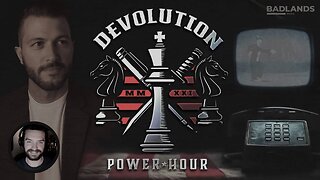Premium Only Content

Internet Archive Bombed Electronically
Cause Before Symptom - With Your Host James Carner
Internet Archive Bombed Electronically
Since May, the Internet Archive has been under DDOS attack. This is when millions of computers are programmed to open a webpage all at once. It forces the CPU to open the website a million times at once. This is called a denial of service attack that overloads the server and it freezes. There are companies that offer services to quickly deny multiple attampts at once like cloudflare, but apparently, the internet archive wasn’t prepared for this cyber attack.
Currently, their founder has said they are working on upgrading their infrastructure and their data has not been corrupted. The Internet Archive was most recently down due to an attack and data breach on October 10, 2024. The hacktivist group SN_BlackMeta claimed responsibility for the attack, which took archive.org and openlibrary.org offline. The group is believed to be affiliated with the pro-Palestinian movement. The Internet Archive is currently offline to focus on data security. The hack compromised the Internet Archive's authentication database, which contained registered member details and hashed passwords. Hackers also stole 31 million passwords.
PEW Research shows 25% of web pages posted between 2013 and 2023 have vanished. A few organisations are racing to save the echoes of the web, but new risks threaten their very existence. So who or what is deleting history? Publishers of books sued Internet Archive for copying copyrighted material. Before the pandemic, the Internet Archive would only lend one digital copy at a time for each physical book in its collection. But during the Covid shutdowns, the organisation lifted that restriction, letting patrons borrow unlimited digital copies of books to try and make up for the closure of physical libraries. A US court ruled that practice was illegal in 2023, and in early September, the Internet Archive’s appeal against that decision was rejected. The organisation previously said that it agreed to pay the a publishing industry trade group an undisclosed sum in relation to the case.
Some conspiracy theorists are claiming that the internet arhive has actually been hacked by the CIA. This is the equivalent of book burning. In the documentary Shadow Gate, the procedure to remove the truth is used by private contractors in defence paid for by the military industrial complex. Whistleblowers Tore and Patrick Bergy, claimed to have worked with the private contractors for electronic and information warfare. Contractors for intelligence agencies. Social media intelligence warfare. Psychological operations. Select an individual or group as a target or an entire country. They can select a group of people in a city and can find everything about them and push an ideology or product to where the state wants to go. They say they can hack their shadows based on their fears which was given to them via social media. They can sway and convince groups of people to sway elections. Since they are private companies, they can get away with this because the state will leave them alone.
Because they have access to all your information via facebook and other social media sites, they can hone down on your wants and needs and then manipulate you through the comments section and send videos in your feed supporting what they want you to believe. This technology has been around since 2008. They can park a van next to a building and be able to sway public opinion through hacking the router of that building and see the cameras, pull the people who are there and then spy on them. Because social media has bots that are your supposed friends, they can respond to your posts with comments that can sway your opinion through humiliation and bombardment of opposite views.
For example, let’s say there is a football stadium and we want to sell ben and jerry’s ice cream. One van can hack into the router of the stadium and the cell towers thus pull every person that is at that stadium’s informaiton. Now, armed with 30,000 people’s profiles, social media accounts and bots that are given to you by the social media companies, they can start adding images, videos and comments in your feed. You wouldn’t even notice that you are being manipulated because you trust that the aglorithm on your social media is giving you information based on your wants and needs. Now, your feed has people talking about trying ben and jerry’s ice cream. And meme’s of ice cream. And comments of ice cream. It will be one in every 10 videos or 10 pictures where it is not really noticed. For some reason, everyone in that stadium will soon want ice cream.
This is just a basic and crude point, but the technology and data sharing by secret service, social media and cell companies is there. Also, companies like Apple have collected your fingerprints, facial recognition features and more where they could easily use against you for blackmail. The federal government has unfettered access to everyone and hacks into companies are the beginning of the blackmail and data sharing scheme. Case in point, the recent DDOS attack on the internet archive. The history of the internet needs to be controlled by the government so they can control history.
History of Internet Archive
The Internet Archive receives financial and in-kind donations from a variety of sources. The Internet Archive is a 501(c)(3) non-profit public charity that is recognized as a library by the government. It provides free access to collections of digitized materials, including websites, software applications, music, audiovisual, and print materials. The Internet Archive also advocates for a free and open Internet.
The Internet Archive is a larger organization that operates the "Wayback Machine," which is a specific service within the Archive that allows users to access archived versions of websites from the past; essentially, the Wayback Machine is a feature of the Internet Archive, not a separate entity. The original idea for the Internet Archive Wayback Machine began in 1996, when the Internet Archive first began archiving the web. Five years after the creation, they had over 100 terabytes and a dozen web crawls completed, the Internet Archive has made the Internet Archive Wayback Machine available to the public.
The Internet Archive has several competitors, including:
Memento
A customizable alternative that aggregates archives from multiple sources, including the Wayback Machine. Memento's Time Travel tool allows users to access archives from multiple sources on the website. Memento also has a Chrome extension that lets users select a date to view a page.
Perma.cc
A web archiving platform that creates permanent records of linked citations. Perma.cc is primarily used by researchers, academics, journals, courts, and educational institutions.
Google Cache
A feature that allows users to view a snapshot of a webpage as it appeared when Google last crawled and indexed it.
Other alternatives to the Wayback Machine include:
MirrorWeb, Archive.Today, Resurrect Pages, CachedView, MessageWatcher, ChangeTower, PageVault, Stillio, and Smarsh.
Founder Brewster Kahle, an American digital librarian, computer engineer, inventor, and philanthropist, founded the Internet Archive in 1996.
The Internet Archive's Wayback Machine is the largest archive of the World Wide Web, covering more than 279 billion pages.
The Internet Archive is a digital library that works by collecting, preserving, and making available digital and physical materials:
Web crawlers
The Internet Archive's web crawlers automatically collect data from the public web to preserve it.
User contributions
Users can upload digital materials to the Internet Archive, such as photos and videos.
Book digitization
The Internet Archive has one of the world's largest book digitization efforts, with over 1.4 million digitized books.
Wayback Machine
The Internet Archive's Wayback Machine allows users to visit archived versions of websites.
Collections
The Internet Archive's collections include audiobooks, vintage video games, live concert recordings, and ancient manuscripts.
Users can access the Internet Archive's resources for free, but some features require an account:
Borrowing books: Users can borrow books for an hour or up to 21 days, depending on the title and copyright status.
Uploading materials: Users can upload materials to the Internet
Archive, such as photos and videos.
Updating, deleting, and exporting account information: Users can update, delete, and export their account information.
The Internet Archive's collections are stored on servers in many locations to keep them safe.
Visitors to the Wayback Machine can type in a URL, select a date range, and then begin surfing on an archived version of the Web. it does not store images and video, but pulls up all content and source code.
Brewster Lurton Kahle born October 21, 1960) is an American digital librarian, computer engineer, Internet entrepreneur, and advocate of universal access to all knowledge. He graduated with a bachelor's degree in computer science and engineering from the Massachusetts Institute of Technology in 1982. In 1996, Kahle founded the Internet Archive and co-founded Alexa Internet. In 2012, he was inducted into the Internet Hall of Fame.
Kahle was born in New York City and raised in Scarsdale, New York, the son of Margaret Mary (Lurton) and Robert Vinton Kahle, a mechanical engineer. He went to Scarsdale High School. He graduated from the Massachusetts Institute of Technology in 1982 with a Bachelor of Science in computer science and engineering, where he was a member of the Chi Phi Fraternity. The emphasis of his studies was artificial intelligence; he studied under Marvin Minsky and W. Daniel Hillis.[8]
After graduation, he joined the Thinking Machines team, where he was the lead engineer on the company's main product, the Connection Machine, for six years (1983–1989). There, he and others developed the WAIS system, the first Internet distributed search and document retrieval system, a precursor to the World Wide Web. In 1992, he co-founded, with Bruce Gilliat, WAIS, Inc. (sold to AOL in 1995 for $15 million), and, in 1996, Alexa Internet (sold to Amazon.com in 1999 for $250 million in stock). At the same time as he started Alexa, he founded the Internet Archive, which he continues to direct. In 2001, he implemented the Wayback Machine, which allows public access to the World Wide Web archive that the Internet Archive has been gathering since 1996. Kahle was inspired to create the Wayback Machine after visiting the offices of Alta Vista, where he was struck by the immensity of the task being undertaken and achieved: to store and index everything that was on the Web. Kahle states: "I was standing there, looking at this machine that was the size of five or six Coke machines, and there was an 'aha moment' that said, 'You can do everything.'"
Kahle was elected a member of the National Academy of Engineering (2010) for archiving, and making available, all forms of digital information. He is also a member of the Internet Hall of Fame, a Fellow of the American Academy of Arts and Sciences, and serves on the boards of the Electronic Frontier Foundation, Public Knowledge, the European Archive (now Internet memory) and the Television Archive. He is a member of the advisory board of the National Digital Information Infrastructure and Preservation Program of the Library of Congress, and is a member of the National Science Foundation Advisory Committee for Cyberinfrastructure. In 2010 he was given an honorary doctorate in computer science from Simmons College, where he studied library science in the 1980s.
Kahle and his wife, Mary Austin, run the Kahle/Austin Foundation. The Foundation supports the Free Software Foundation for its GNU Project, among other projects, with a total giving of about $4.5 million in 2011.
In 2012, Kahle and banking veteran Jordan Modell established Internet Archive Federal Credit Union to serve people in New Brunswick, N.J. and Highland Park, New Jersey, as well as participants in programs that alleviate poverty in those areas. The credit union voluntarily liquidated in 2015.
Kahle has been critical of Google's book digitization, especially of Google's exclusivity in restricting other search engines' digital access to the books they archive. In a 2011 talk Kahle described Google's 'snippet' feature as a means of tiptoeing around copyright issues, and expressed his frustration with the lack of a decent lending system for digital materials. He said the digital transition has moved from local control to central control, non-profit to for-profit, diverse to homogeneous, and from "ruled by law" to "ruled by contract". Kahle stated that even public-domain material published before 1923, and not bound by copyright law, is still bound by Google's contracts and requires permission to be distributed or copied. Kahle reasoned that this trend has emerged for a number of reasons: distribution of information favoring centralization, the economic cost of digitizing books, the issue of library staff without the technical knowledge to build these services, and the decision of administrators to outsource information services.
Kahle advocated in 2009:
It's not that expensive. For the cost of 60 miles of highway, we can have a 10 million-book digital library available to a generation that is growing up reading on-screen. Our job is to put the best works of humankind within reach of that generation. Through a simple Web search, a student researching the life of John F. Kennedy should be able to find books from many libraries, and many booksellers—and not be limited to one private library whose titles are available for a fee, controlled by a corporation that can dictate what we are allowed to read.
In 1997, Kahle explained that apart from the value for historians' use of these digital archives, they might also help resolve some common infrastructure complaints about the Internet, such as adding reliability to "404 Document not found" errors, contextualizing information to make it more trustworthy, and maintaining navigation to aid in finding related content. Kahle also explained the importance of packaging enough meta-data (information about the information) into the archive, since it is unknown what future researchers will be interested in, and that it might be more problematic to find data than to preserve it.
Physical media
"Knowledge lives in lots of different forms over time," Kahle said in 2011. "First it was in people's memories, then it was in manuscripts, then printed books, then microfilm, CD-ROMs, now on the digital internet. Each one of these generations is very important." Voicing a strong reaction to the idea of books simply being thrown away, and inspired by the Svalbard Global Seed Vault, Kahle envisioned collecting one physical copy of every book ever published. "We're not going to get there, but that's our goal," he said. "We want to see books live forever." Pointing out that even digital books have a physical home on a hard drive somewhere, he sees saving the physical artifacts of information storage as a way to hedge against the uncertainty of the future. (Alongside the books, Kahle plans to store the Internet Archive's old servers, which were replaced in 2010.) He began by having conventional shipping containers modified as climate-controlled storage units. Each container can hold about 40,000 volumes, the size of a branch library. As of 2011, Kahle had gathered about 500,000 books. He thinks the warehouse is large enough to hold about a million titles, with each one given a barcode that identifies the cardboard box, pallet and shipping container in which it resides. A given book may be retrieved in about an hour, not to be loaned out but to be used to verify contents recorded in another medium. Book preservation experts commented he will have to contend with vermin and about a century's worth of books printed on wood pulp paper that disintegrates over time because of its own acidity. Peter Hanff, deputy director of UC Berkeley's Bancroft Library, said that just keeping the books on the west coast of the US will save them from the climate fluctuations that are the norm in other parts of the country.
Brewster Kahle, whether having evil intentions or not, inadvertantly could have been attacked by the state for access to the Internet Archive which was blamed on Palestinians to support Israel and their war crimes. Why Palestinians would need access to the history of websites is unclear, but they could have picked a better boogie man. Like Russia. Regardless, it would appear to look like what once was a good way of going back to website histories to find information is now threatened. The blowback from such an operation can have a huge advantage for the state in keeping secrets and removing valuable proof for gaining data and sources. If the state can remove any old website that had information about their own corruption, would be lost.
That is, if internet archive is actually being attacked by the state in the first place. They could have been working with the state already. In May 2024, the Internet Archive announced it was in the midst of a large distributed denial of service (DDoS) attack. In a DDoS attack, vandals or other bad actors set up automated systems to bombard websites with visits, attempting to push them offline by overwhelming their servers. At its peak, tens of thousands of concurrent visits were happening every second. Services, including the Wayback Machine, went down. It meant that the regular drumbeat of archiving was disrupted for a time, and there may be permanent gaps in the historical record as a result. My guess is, Brewster is not cooperating. This isn’t the first time they have been under attack, either. But it is the first time they have been under consistant attack over several months.
The internet archive and wayback machine has been so useful for gathering evidence to support facts and truth. I use it almost daily for finding sources of information and data that at one time was gathered.
Private contractors can legally gain access to all backdoor data bypassing the rules and regulations of spying on americans. This is a sneaky way to gather intelligence without any oversight.
This is war. Our own library of information is being attacked by our own administration and blaming it on Palestinians. The documentary Shadow Gate by truther and former InfoWar’s coorespondant Millie Weaver exposed the military industrial complex’s connections to private organizations that are being used to spy and manipulate americans via mind control. Days after its release, she was arrested for apparently robbing her own mother. Charges were later dropped and it didn’t deter her from creating another documentary called Shadow Gate 2.0, which was just released, where she explains the news media has turned from fake news to political spin. She talks about the smithmundt act and how it is being used to legally lie to the american people.
She also exposes how domestic propaganda became legal under the H.R.6971 - Educating Against Misinformation and Disinformation Act. This gave funding to start committees to fact check information which favors the state and it paid jounralists to print false information. Apparently, we tested all of this on Iraq which was a great success. Now, those weapons against the Iraq people is now being used on us. After the destruction of Iraq, Halliburton came in under Dick Cheney and rebuilt the country’s infrastructure under the american tax payer expense. It was a con to rebuild Iraq using American corporations and chaging the american taxpaper.
USA Today attacked Millie for her first documentary for actually doing journalistic work. She’s back now trying to warn the people that our own country is attacking its own people by attacking Internet Archive, with the goal to remove and change history to favor the state. We are under psychological warfare that was used on our own supposed enemies. The kind of equipment they use to change public opinion could easily stop those who find a gun and shoot up a school. The fact that President Trump has had two attacks on his life publicly proves the weapons are bring used on the people and not to stop people from hurting others.
One thing that rings loud to me is the mobility of this equipment. They could drive these mobile data centers on trucks and park vehicles n cities if swing states. They could literally bombard an entire city’s cell phone coverage to sway the vote. All they would need is access to WiFi and Starlink would work just fine. Think about it, a mobile hacking forces that can setup shop in a city within minutes to steer the public away from your candidate and towards theirs. Wouldn’t surprise me if both parties are doing this now. Of course, they don’t need to be mobile. They can do this through proxy servers in another country and make it appear it is all coming from Russia when in fact, the servers are just in Italy. The Mueller report said this exact same thing about the Trump campaign that there is no definitive way to prove Russian IP’s were used to help Trump’s campaign in 2016. Even if the IP’s said Russia, they still could be in Italy.
An attack on our knowledge is an attack on our country. Internet Archive has been used in court cases. It has led to many arrests. If Brewster gives in to the demands of the hackers, we will lose our history once again. This kind of warfare isn’t surprising given there are gaps of missing information dating back to the age of reason. This is why the library of Alexandria was burnt down. To keep the people docile, stupid, drugged and complacent just enough to do their jobs. And believe it or not, the technology that is being used on us is old. It’s been around for 20 years. It’s origens are from our own military in Iraq after 9/11. The technology they have now, with AI, surpasses all I have reported.
sources
https://en.wikipedia.org/wiki/Brewster_Kahle
https://www.niemanlab.org/2022/03/after-25-years-brewster-kahle-and-the-internet-archive-are-still-working-to-democratize-knowledge/
Shadowgate I:
https://www.bitchute.com/video/xGqHkujaTHpv
Shadowgate 2.0: Rise of the Fake New Industrial Complex
https://www.bitchute.com/video/qLWXRRinngDj
https://www.bbc.com/future/article/20240912-the-archivists-battling-to-save-the-internet
-
 2:29:46
2:29:46
FreshandFit
10 hours agoAfter Hours w/ Girls
135K90 -
 5:28
5:28
Zach Humphries
16 hours ago $2.59 earnedNEAR PROTCOL AND STELLAR TEAM UP!
36.4K4 -
 1:09:57
1:09:57
Brandon Gentile
1 day ago10,000 Hour BITCOIN Expert Reveals Why $13.5M Is Just The Start
36.3K7 -
 2:03:55
2:03:55
Badlands Media
10 hours agoDevolution Power Hour Ep. 382: DOJ Coverups, Clapper’s Team Sport & Trump’s Countermoves
149K26 -
 2:06:30
2:06:30
Inverted World Live
13 hours agoDon't Approach the Zombie Rabbits | Ep. 95
62.3K28 -
 3:26:45
3:26:45
Drew Hernandez
9 hours agoISRAEL PLANNING POSSIBLE DRAFT IN USA & TRUMP'S VIEW ON ETERNAL LIFE ANALYZED PT 2
47.7K69 -
 3:08:07
3:08:07
TimcastIRL
12 hours agoTexas Republicans Win, House Passes Redistricting Map, GOP Looks To Gain 5 Seats | Timcast IRL
212K115 -
 1:30:34
1:30:34
FreshandFit
13 hours agoHow To Stay Focused While Pursuing Women...The Good, The Bad, And The Ugly
71.8K42 -
 1:47:05
1:47:05
Drew Hernandez
17 hours agoISRAEL PLANNING POSSIBLE DRAFT IN USA & TRUMP'S VIEW ON ETERNAL LIFE ANALYZED PT 1
48.7K67 -
 29:55
29:55
Afshin Rattansi's Going Underground
3 days agoProf. Omer Bartov: The REAL REASON the US, UK, and EU Have Not Recognised Israel’s Genocide in Gaza
44.6K32